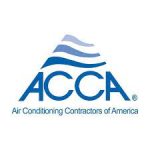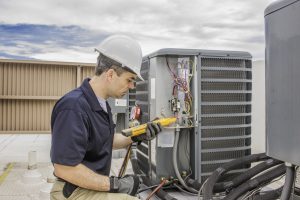HVAC technicians have a job, and that is to ensure that the climate control system in a building or home is functioning as it should.
If becoming an HVAC technician sounds like a career you may be interested in, you must first begin by searching for the necessary training programs to receive the education you need.
This guide will explain the typical requirements needed to become an HVAC technician, in addition to educational opportunities.
7 Steps to Become an HVAC Technician
If you’re contemplating becoming an HVAC technician, here are several steps you must first complete:
1. Receive a High School Diploma or GED
Aspiring HVAC technicians must first earn their high school diploma or GED.
If you are still in high school and preparing yourself to become an HVAC technician, vocational school is an option.
These schools provide courses that teach you mechanical skills.
These skills can help you on your path to pursuing your career.
2. Find an HVAC Training Program
After graduating from high school, aspiring HVAC technicians must enroll in a training program.
If you’re looking for the quickest way to become certified, you should consider enrolling in a certificate program.
These programs can be completed in just 10 months.
Other aspiring HVAC technicians may decide to enroll in a college or university and earn either an associate’s degree or a bachelor’s degree.
These programs focus specifically on expanding your HVAC skills and knowledge but also include other elective studies.
They give you more of a boost when looking for open positions as an HVAC technician.
3. Enroll in an Apprenticeship
Enrolling in an apprenticeship is not required but is highly recommended.
Many employers prefer HVAC technicians who have undergone an apprenticeship.
These typically last anywhere from three to five years.
Apprenticeships are beneficial in that they enable students to further their education in the field while also gaining hands-on experience.
4. Obtain State Approval
In order to successfully work as an HVAC technician, you must be licensed by the state in which you plan on working.
Requirements will vary depending on the state you reside in.
However, all states do require one certification, known as the Section 608 Technician Certification.
This enables technicians to utilize refrigerants while working.
5. Additional Certification is Recommended
Although there’s no legal requirement that says HVAC technicians need additional certification, it’s always required if you want to make yourself stand out.
For instance, North American Technician Excellence is an organization designed for HVAC professionals.
They offer four different certificates to choose from, all of which are optional.
These certificates are:
- Ready-to-Work Certificate
- HVAC Support Technician Certificate
- Core and Specialty Tests Certificate
- Senior Level Efficiency Analyst Certificate
6. Create a Resume
Being able to put together a strong resume that stands out is critical to finding work.
This is especially true when you’re considered entry-level.
Without having any prior experience, you may want to use either a combination resume or a functional resume.
Don’t forget to add the apprenticeship to your resume, if you have completed one, as it can be used as work experience.
7. Customize Your Resume
Finally, before you start applying for jobs, you should customize your resume so that it matches the position you are applying for.
All HVAC technicians are different.
Some may require certain skills and have varying responsibilities.
Making these necessary changes will only enhance your chances of standing out. First impressions are everything.
Licensing Requirements to Become an HVAC Technician
Every state has different licensing requirements for HVAC technicians.
In addition, some states have local licensing requirements but no state licensing requirements.
For example, this is the case in both Indiana and Illinois.
They both have their own local licensing requirements but no state requirements.
With that being said, even though licensing requirements can vary from state to state, the following are some common requirements that all states have:
- Most states require HVAC technicians to complete HVAC training or at least an apprenticeship before becoming licensed. These programs can be attained through a community college, vocational school, or even a trade school.
- Many states also require HVAC technicians to have work experience before receiving their license. This means that a certain number of years of practical experience are needed.
- An exam is also required for HVAC licensing. The exam consists of various topics covering electrical systems, local building codes, and more.
- The EPA requires HVAC technicians who utilize refrigerants during work to obtain an EPA 608 certification.
- HVAC technicians must also know local building codes.
- Insurance and bonding are required by various local jurisdictions or states.
- HVAC technicians must pass a criminal background check, which is required as part of the licensing process.
- Licensing fees must be paid in advance. These fees cover the application, exams, and license renewals.
Online Training Programs
The following schools offer online programs for students looking to become an HVAC technician:
Ashworth College
Ashworth College provides the option for those looking to obtain their HVAC certificate.
It is fully online and suitable for those looking for a convenient schooling experience.
It will take about four months to complete the program.
The school offers the option to pay $799 in full or $959 if you pay monthly.
This program provides students with the knowledge they need to be able to troubleshoot, install, and maintain HVAC systems for both commercial and residential buildings.
Penn Foster
Penn Foster also offers an online accredited HVAC program.
This program is designed to prepare students to become HVAC technicians.
This program can take anywhere between seven and eleven months to complete.
The program offers nine different courses, including the fundamentals of HVAC/R, electrical systems, and more.
Students can either pay $899 if they plan on paying the full amount or $1,089 if they wish to pay every month.
Air Conditioning Contractors of America
Another online school that offers HVAC certification is Air Conditioning Contractors of America.
The program is perfect for technicians, wholesalers, contractors, and more.
The cost is $495 and can be completed in 22 to 25 hours.
Certification programs for this school are offered in EPIC instructor competencies, light commercial HVAC design, and refrigerant handling.
HVAC Training Solutions
HVAC Training Solutions offers individuals several different online training programs, including HVAC technicians, commercial refrigeration, and NATE certification.
Students can take the courses at their own pace.
However, the expected completion time is between 10 and 18 weeks.
The HVAC technician course covers 20 different training modules on topics such as matter and energy, heat, pressure, troubleshooting electric motors, and more.
The cost is $985 for those wishing to pay the amount in full or $217 for those wishing to pay every month.
HVACRedu
Another online school that offers an HVAC technician program is HVACRedu.
It is a program that takes 256 hours to complete.
It is ideal for students who are new to the industry.
It is also perfect for technicians who are not yet certified and installers who wish to earn formal education to help them prepare for exams and licensing.
The total cost of this program is $2,665.
Salary
According to the Bureau of Labor Statistics, the annual salary for HVAC technicians is $51,390.
This is equivalent to $24.71 per hour.
The job outlook for HVAC technicians is expected to increase by 6 percent from 2022 to 2032.






